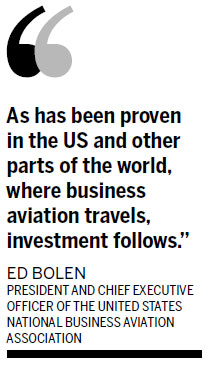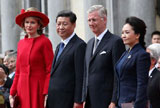APEC countries back business flight growth
Updated: 2013-09-10 07:00
By Yao Jing (China Daily)
|
||||||||||
Business aviation in China and across the Asia-Pacific region will be supported by the approval of a core statement by the transportation ministries of the 21 countries in the Asia Pacific Economic Cooperation, or APEC, forum.
APEC economies reached a consensus on the benefits of a regional framework to support the development of the business aviation sector during a meeting held in Tokyo last week.
They agreed that business aviation operations should be treated, from an economic regulatory standpoint, as non-commercial, not-for-hire aviation. As such, companies in the sector may have the freedom to fly within and between any points in all of the APEC nations, in accordance with each country's applicable requirements.
Further, any operating permission for business aviation operations will be considered and acted upon in a timeframe suitable to their operational needs.
"Asia-Pacific nations are among the fastest-growing in the world, with ever-accelerating rates of inbound and outbound investment," Ed Bolen, president and chief executive officer of the United States National Business Aviation Association, said at a news conference on Monday. "The upswing in business activity in the region has increased the demand for prompt, reliable access to business destinations throughout China and across the Asian region."

"As has been proven in the US and other parts of the world, where business aviation travels, investment follows," Bolen added.
The new framework will foster the growth of an overall regulatory regime that promotes aviation mobility, flexibility and efficiency. Also, it will help to promote business investment, job creation, tax-revenue generation and other benefits of a robust business aviation sector, according to the APEC statement.
However, Bolen pointed out the statement is just a guideline.
"Although it will facilitate business aviation, it will not change the situation of the industry quickly. Nevertheless, it is giving a message that the further progress of the industry has been recognized," Bolen added.
Unlike the US, where the business aviation sector has been around for decades, Bolen said that the industry in China is still in an early stage, but it's growing at the fastest pace around the world on a percentage-point basis.
"In 2012, about 100 private jets were added in China, and by the end of 2012, there were about 300 in the country," Bolen said.
However, the operational environment for business aviation is waiting for improvements in the immature market and it's still hampered by a tightly controlled airspace as well as a lack of airports and pilots.
"In the process of introducing private jets or during the flights, operators have to pay high tariffs and are faced with other barriers such as additional costs," said Wu Jingkui, chairman of the Asia Business Aviation Association.
For instance, under strict air traffic control rules and restrictions in China, private jet owners are not able to fly as frequently as they would like to. According to the regulations, anyone seeking to fly from one airstrip to another must file flight plans with the military and the civil aviation agencies and get approval.
Bolen said that China will continue to be the most attractive marketplace for the sector. With the market maturing, there will be more demand for business aviation in the country.
Government leaders are increasingly recognizing the connection between aviation and economic growth, job creation and connectivity to the international market.
China pledged in its 12th Five-Year Plan (2011-15) to reform how it manages its airspace and has indicated that it wants to improve both the allocation and use of airspace resources.
yaojing@chinadaily.com.cn
(China Daily 09/10/2013 page17)









